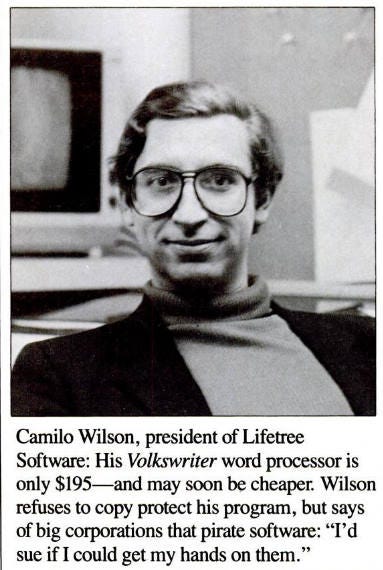Volkswriter Deluxe
The Most Popular Word Processor for the IBM Personal Computer (according to the ad)
In June 1981, a man named Camilo Wilson purchased an IBM PC. In fact, he camped outside the computer store and purchased one of the first 10 IBM PCs in California. Wilson was so impressed with his new computer, he decided that he wanted to write a book about it. However, he ran into a roadblock. The only word processor available for the IBM PC, IBM’s EasyWriter, was horrible. As Wilson put it, “The horrors of EasyWriter were such that I decided to write my own word processor to get the book done.”
Wilson makes it sound rather easy to create a word processor from scratch:
“Of course, I had to quickly learn Pascal, because there wasn’t an IBM assembler available then, but since I knew a half dozen assembly languages, that part was fairly easy…At the end of two weeks, I knew I had a viable word processor.”
Once he was finished, Wilson realized that he had a product that could fill an existing need. Other users were unhappy with EasyWriter and MicroPro hadn’t ported WordStar to the platform yet. (At the time, WordStar was one of the most popular word processing applications.) So he borrowed $15,000 and started a company to sell his software.
The names he chose for the application and the company had their own little story. The application was originally called Planwriter, but was quickly changed to Volkswriter. The new name was a reference to “the similarly plain-but-reliable Volkswagen.” According to Wilson, “Most of the other word processing programs on the market had these outer-space-sounding names like WordStar and Magic Wand and Electric Pencil, and we wanted something down-to-earth.” The name Wilson chose for his new company, Lifetree was a spoof of two other software companies: Lifeboat and Peachtree.
For a short period of time, Volkswriter was the only game in town. WordStar hit the IBM PC market 9 months after Volkswriter debuted. Volkswriter had a bit of an advantage because it was simpler and easier to learn than WordStar. It also supported more printers. The initial version of WordStar only supported “the IBM/Epson printer”.
By 1984, Volkswriter had 40,000 registered users and $2 million in sales.
Reviews
The November 1982 issue of PC Magazine had the following to say about Volswriter 1.1: “…Volkswriter may no longer claim the distinction of being the only fully functioning word processor available for the PC. But for ease of use, performance, and versatility, it leads the pack in the word processor Grand Prix.”
The same issue also reviews Volkswriter 1.2, which was released after the review of 1.1 had been written and typeset. The second review states:
“Volkswriter always had the best price/performance ratio of any of the word processors around. This is because Volkswriter's author, Camilo Wilson, has always intended to sell his program to the bottom 80 percent of the word processing market. And like the popular Volkswagen of the auto industry that has progressed from the standard Beetle to the sportier Rabbit, the new version, Volkswriter 1.2, has major changes and deserves to be notated in a more auspicious way than as an update of 1.0 to 1.2. Volkswriter now leaves little to be desired.”
Volkswriter 4 was reviewed in the October 1991 issue of Compute:
“Do the words advanced, powerful, and professional intimidate you? To the rescue comes the Volkswriter line of word processors, offering power and advanced capabilities with an inviting menu interface and simple commands. And while Volkswriter 4 targets managers and professionals, anyone who's familiar with word processing will quickly pick up the commands.”
Legacy
Unfortunately, Volkswriter was only able to stay profitable for a short time. The company was eventually sold to the employees. I couldn’t find any trace of the company on the web today.
Camilo Wilson went on to found another company named Cogix. This new company focuses on survey and polling software.
If this article piqued your interest, you can try out Volkwriter 3 on the Internet Archive. In 2011, a PC World writer decided to see if he could use a 30-year-old IBM 5150 to get work done. It included using Volkswriter 3. Enjoy.
What computer ads would you like to see in the future? Please comment below. If you enjoyed, please share with your friends and relatives. Thank you.







A fun fact about VolksWriter.
Long after it was largely obsolete and forgotten, a late marketing push was unexpectedly successful. A UK cover magazine ran a demo version on its cover disk. The company crippled the demo version by deleting a few files.
Then they duplicated the disk and it was sent out.
But the thing is... block-duplicated disks contain every sector of the original. So they contained the deleted files too. Meaning that you could run a DOS undelete tool, of which there were many, and guess the first character of the filename and un-crippled the program... getting a full completely-working version, entirely legally. I mean they gave it to you on a cover disk, right?
Once word spread about this "hack" the cover disk became quite sought-after and the app got thousands of new users in the UK.
TBH it wasn't an amazing app but it wasn't terrible either. But the company didn't make any sales of this small, understandable but foolish mistake.
"The name Wilson chose for his new company, Lifeboat, was a spoof of two other software companies: Lifeboat and Peachtree."
according to the ad, the company was named Lifetree :)